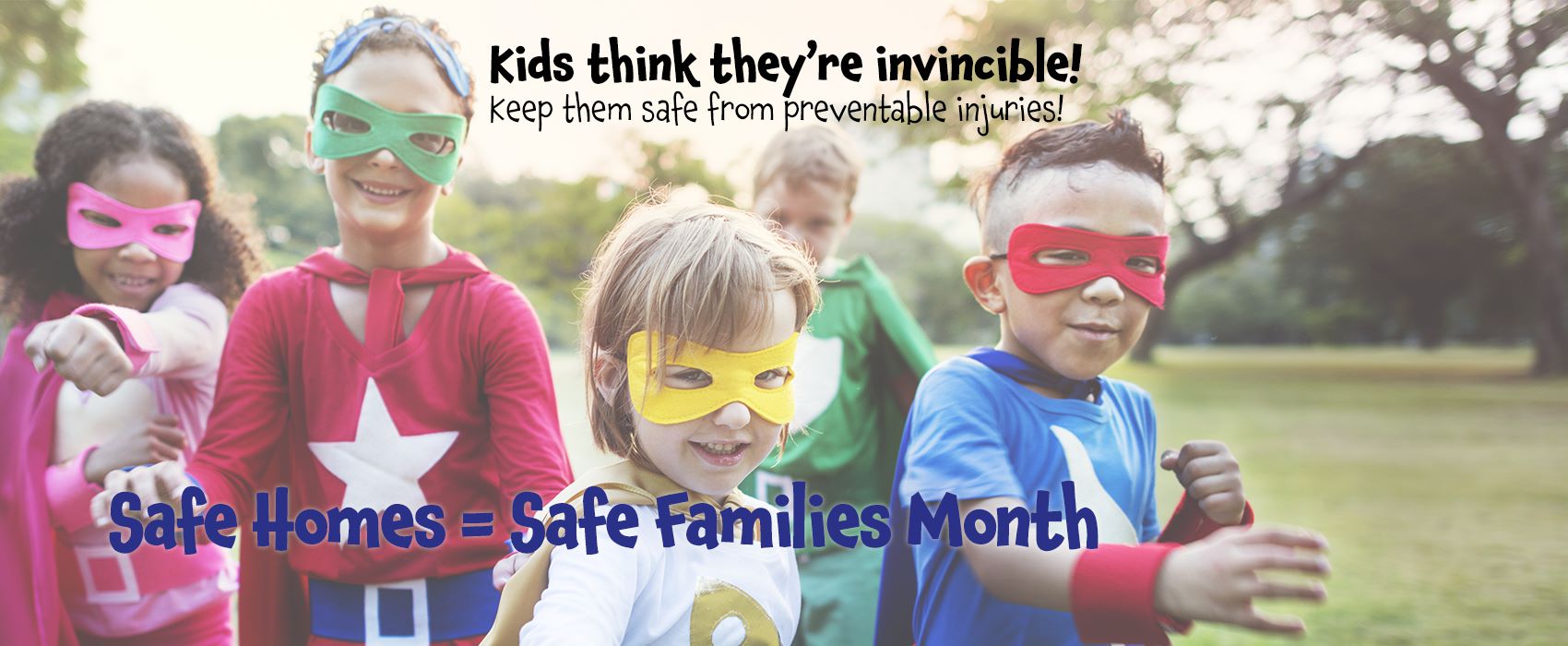It’s Safe Homes = Safe Families Month
Injuries are the leading cause of death in children ages 19 and younger. But most child injuries can be prevented. Parents and caregivers can play a life-saving role in protecting children from injuries.
FACTS:
- Unintentional injuries are the leading cause of death for children ages 1-14 in Michigan.
- Unintentional home injury/deaths to children are caused primarily by motor vehicle traffic crashes, fire and burns, suffocation, drowning, firearms, falls, choking and poisoning.
- The Michigan Department of Health & Human Services’ Injury and Violence Prevention Section works with state and local partners to help Michigan communities stop injuries and violence.
- Safe Kids Michigan implements evidence-based programs, such as car-seat checkups, safety workshops and sports clinics that help parents and caregivers prevent childhood injuries.
- The American Academy of Pediatrics recommends that no child under the age of 16 operate a ride-on mower and that no child under 12 operate a powered or non-powered push mower.
- Helmets can reduce the risk of severe brain injuries by 88 percent – yet only 45 percent of children, 14 and under usually wear a bike helmet
- Young children are at increased risk from unintentional injuries in the home because it is where they spend most of their time.
THINGS TO CONSIDER INSIDE & OUTSIDE YOUR HOME:
This list is not exhaustive. Please see resources on the front for more information.
Child’s bedroom:
- Make certain there is a carpet or rug beneath the crib or changing table to soften the impact if an infant falls.
- Remove all crib gyms, hanging toys, and decorations from a crib by the time a baby can raise up on hands and knees.
- Make sure there is a safety belt on the infant changing table, and that it is used properly every time.
- Never leave small parts or pieces of a toy(s) in a child’s room.
- Make certain a night-light is not near or touching drapes or the bedspread. Also, never place towels or other fabric over a lamp to reduce the light in the room, as a fire may start.
- Never place a crib, playpen, or bed near a window.
- Use plug protectors for all unused wall outlets.
- If there is a lid on the toy box, it should not be heavy, hinged, or lockable. Children may crawl inside and become trapped.
Bathroom:
- Put a nonskid bathmat on the floor and a nonskid mat or decals in the bathtub.
- Store medications, cosmetics, toiletries, and cleansers well out of reach of children. Put childproof caps on all medications if you have children younger than 8 years of age.
- Always unplug appliances before leaving them unattended, no matter how briefly.
- To avoid accidental scalding, make certain the tap water temperature is set no higher than 120° F.
- Never leave a child or disabled person unattended in a bathroom where there is a tub, sink, or bucket containing water – not even for a moment.
Kitchen:
- Make certain knives, scissors, and other sharp utensils are out of reach of children.
- Store dishwasher detergent and other cleaning supplies out of reach of children.
- Install child resistant safety latches on all cabinets and drawers within a child’s reach.
- Always turn pot handles inward when cooking on the stove. Use back burners whenever possible.
- Make certain appliance cords are not dangling, so they cannot be pulled from a counter.
- Cut food for toddlers into tiny pieces.
- If your child uses a highchair, make sure it is sturdy and has a seat belt with a strap between the legs.
- Keep a working fire extinguisher in your kitchen.
Outdoors:
- Keep stairs and walkways clear of snow, wet leaves, or other debris.
- Repair cracks or chips in cement sidewalks and stairs.
- Make certain railings, gates, and fences are secure and in good repair.
- Keep garbage cans covered.
- There should be a fence with a locked gate between the house and the backyard swimming pool.
- Play equipment, such as swing sets and garden furniture, should be properly anchored and assembled.
Miscellaneous:
- If you are using a heat source – i.e., fireplace, wood burning stove – place barriers around it to avoid accidental burns.
- Make certain hazardous items, such as bug sprays, cleaners, auto care products, weed killers, are secured and stored properly.
- Make certain plastic bags (suffocation) and small objects (choking) are stored out of reach of children.
- Keep matches and lighters out of the reach of children and disabled persons.
- Ensure you have two unobstructed exits, in case of fire or other emergency.
- Check all electrical cords to make sure they are not cracked or frayed.
- Make certain outlets or extension cords are not overloaded.
- It’s best not to use space heaters, however if they’re used make sure they are in safe condition, don’t plug them into an extension cord, don’t place them near drapes or furnishings.
- Paint or wallpaper should not be chipping or peeling.
- Keep purses, backpacks, and other portable storage bags out of a child’s reach – they may contain medicines, penknives, hard candies, and other items that may harm children.
Quick Links
Michigan Dept. of Health & Human Services Injury & Violence Prevention
http://www.michigan.gov/mdhhs/0,5885,7-339-71548_54879—,00.html
Safe Kids Michigan
http://www.michigansafekids.org/
Beaumont Hospital’s Household Safety Checklist
http://healthlibrary.beaumont.edu/InteractiveTools/Calculators/85,P00822
Centers for Disease Control and Prevention Injury Prevention & Control
http://www.cdc.gov/injury/index.html


